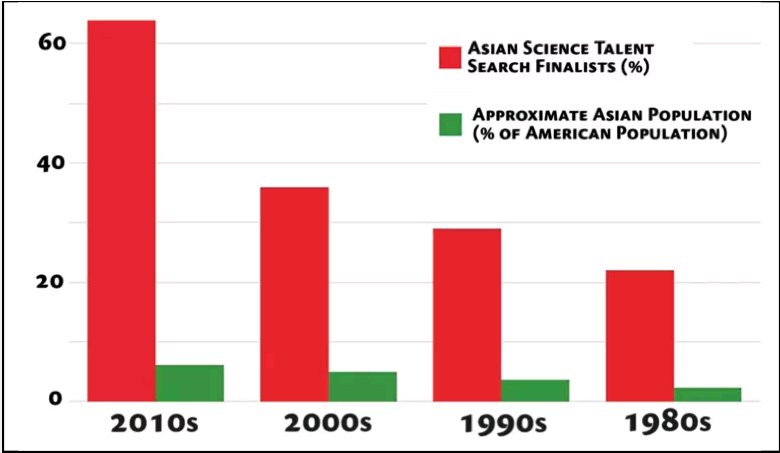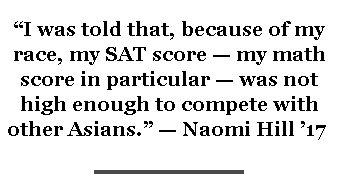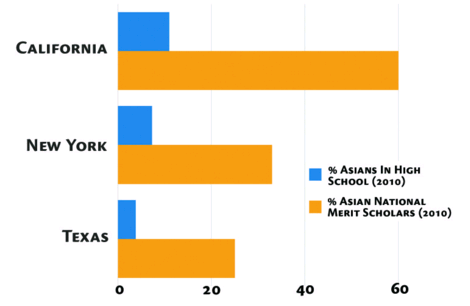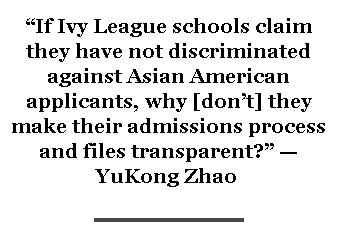
Asian representation in elite academic competitions has risen dramatically over the past three decades. Their representation at elite colleges has not.
All three of Naomi Hill's '17 older siblings attended Ivy League schools. Hoping to follow her siblings' path, Hill — then a freshman in high school — sat down with her counselor to chart her own path to college. But before she could get her feet off the ground, her counselor warned, "because you’re Asian, you will be compared against people with GPAs and test scores that are this much higher."
Hill, who was adopted and raised in a white, Jewish household, questioned the ‘Asian’ grouping.
"I didn't feel that it was fair for me to be put into that vast group," Hill said.
The same sense that Hill's counselor had about Ivy League admissions — that Asian applicants must perform better than non-Asians to achieve parity — underlies the newest tide of legal challenges to the use of race in admission, a tide that now is rolling toward Ithaca’s shores.
In late August, a group called the Asian American Coalition for Education filed a complaint against Cornell and Columbia with the Department of Education, alleging the two universities engaged in "systematic illegal discrimination against Asian American students." The AACE filed a similar complaint three months earlier against Brown, Dartmouth and Yale, again alleging discriminatory admission practices against Asian applicants.
Hill said that her counselor, other Asian parents and Asian students at her high school shared the assumption that Asian applicants must meet a higher standard of assessment in admissions.
"I was told that, because of my race, my SAT score — my math score in particular — was not high enough to compete with other Asians and that I might not get into an Ivy or a top school because of it," Hill said. "I had one friend whose mother signed her up for every extracurricular that either I or my other Asian friends were in, just so her daughter would be on par with the other Asians from her high school."
The AACE report provides some evidence to support this view, citing a book, No Longer Separate, Not Yet Equal, that documents admission disparities by race at four unnamed elite private schools and three elite public schools. The researchers found that, between similarly situated Asian and white applicants, an Asian applicant is 67 percent less likely than a white applicant to receive an offer of admission. The researchers also found that Asian applicants must score considerably higher on standardized tests to reach a likelihood of admission comparable to that of non-Asian applicants.
Prof. Richard Sander, law, UCLA and Medha Uppala conducted a similar study with data from three unnamed Ivy League schools. Sander and Uppala concluded, "No other racial or ethnic group at these schools is as underrepresented relative to its application numbers as are Asian Americans. Indeed, no other racial or ethnic group comes even remotely close to this level of underrepresentation."
‘The New Jews’
“When people argue that there is discrimination against Asians in the Ivy League, I agree,” Hill said. “There is.”
Sara Harberson, a former associate dean of admissions at the University of Pennsylvania, corroborated Hill’s belief.

“[H]olistic admissions can allow for a gray zone of bias at elite institutions, working against a group such as Asian Americans that excels in the black-and-white world of academic achievement,” Harberson wrote in a Los Angeles Times op-ed.
Does data support this assertion?
Cornell is 18.09 percent Asian — defined as “having origins in any of the original peoples of the Far East, Southeast Asia, or the Indian subcontinent” — according to the University’s 2015-2016 Common Data Set. This figure puts the University just above the median Asian enrollment in the Ivy League, but well above Dartmouth (15.21 percent) and Brown (13.32 percent) and fairly below Princeton (21.50 percent) and the University of Pennsylvania (20.14 percent).
But the AACE and others say these figures are out of balance with the Asian population, and especially the group’s academic record.
Asian success in elite academic competitions nationwide is well documented. In 2010, Asian students constituted only 11 percent of California’s high school population, but 60 percent of the state’s National Merit Scholars. The same pattern of overachievement has been documented in a number of states, including Texas and New York.
Sixty-four percent of Intel Science Talent Search finalists since 2010 have also been Asian American, though Asians constituted only 5.8 percent of the U.S. population as of 2011, according to the Pew Research Center. Thus, Asian students are among the highest academic achievers in the country.

Data Courtesy of Ron Unz
The percent of National Merit Scholars who are Asian is several times higher than expected from their representation in the population.
Asian Americans also compose at least 31 percent of Presidential Scholars, although the true figure may be higher because Asians without a traditionally Asian last name, like Hill, were not counted in the analysis that produced this figure.
More so than the other competitions, the Presidential Scholar criteria match many Ivy League schools’ broad-based criteria for admission. Candidates are evaluated not only on their academic record, but also on their “personal characteristics, leadership and service activities, and an analysis of their essay,” according to the program’s website.
“Accordingly, one would expect the percentage of Asian Americans selected as Presidential Scholars to predict the percentage admitted to the Ivy League colleges,” the AACE’s complaint said. “It does not.”
Ivy League schools’ apparent failure to respond to Asian American population growth and high academic achievement has led the AACE and other researchers to dub Asians “the new Jews.” The nickname alludes to several Ivy League schools’ well-documented discrimination against qualified Jewish applicants in the 1920s and 1930s.
Notably, Cornell did not institute racial and ethnic quotas to exclude Jewish students, according to the University. However, Cornell did adopt, and still uses, legacy preference policies that were originally implemented in other schools “to screen out Jewish applicants,” according to The New York Times.
The AACE’s complaint against Brown, Dartmouth and Yale recounted a study that compared Asian enrollment at the eight Ivy League schools, including Cornell, to that at the California Institute of Technology, where an applicants’ race is not considered in admission decisions. The study’s key finding: CalTech’s Asian enrollment coincides with Asian population growth, but Ivy League enrollment does not.
“The relative enrollment of Asians at Harvard [plummeted], dropping by over half during the last 20 years, with a range of similar declines also occurring at Yale, Cornell, and most other Ivy League universities,” said Ron Unz, the researcher who conducted the study, in the paper.
“The yearly fluctuations in Asian enrollments are often smaller than were the changes in Jewish numbers at those institutions during the ‘quota era’ of the past,” Unz added.
The University’s Defense
The University, citing its “practice not to comment on active or pending litigation,” declined to comment on these specific allegations of discrimination, but it defended its race-conscious admissions policies in an amici curiae (“friends of the court”) brief filed with the Supreme Court in Fisher v. University of Texas (2016).
In the brief, seven Ivy League schools — all except Harvard — and a number of other elite universities argued that race-conscious admissions processes are necessary to acquire the academic benefits that flow from diversity, an interest the Court has deemed “compelling.”
“Diversity encourages students to question their assumptions, to understand that wisdom may be found in unexpected voices and to gain an appreciation of the complexity of today’s world,” the universities wrote in the brief.
The universities further argued that their policies “will hasten the arrival of the day when race no longer matters.”
Since 1978, the Supreme Court has allowed universities to defend race-conscious admissions policies on the same grounds that the amici brief describes.
However, AACE president YuKong Zhao said the University has left many questions unanswered.
“If Ivy League schools claim they have not discriminated against Asian American applicants, why [don’t] they make their admissions process and files transparent?” he said.
Zhao also questioned the authenticity of the University’s commitment to diversity.
“If Ivy League schools really cherish diversity, why [don’t] they use their legacy slots to help disadvantaged minorities, instead of limiting Asian American enrollment?” Zhao asked. “When will Ivy League schools start promoting diversity on their sports teams?”
In response to Zhao’s questions, the University reiterated its decision “not to comment on active or pending litigation.”
Student Perspectives
Attitudes toward the University’s admission policies among Cornell’s Asian community are complicated.
For many, the history of race-conscious admission as a means to increase the enrollment of historically underrepresented groups — particularly African Americans — paints race consciousness favorably.
“Because we see other minority groups benefitting from this, even though we may not individually benefit from it, we have compassion and a willingness to be for this policy that helps our fellow minority groups,” said Francis Ledesma ’19, treasurer of the Cornell Filipino Association. “And we recognize that diversity makes Cornell a better place.”

The Asian Pacific Americans for Action at Cornell has also defended the University’s race-conscious admission approach.
“Students of color, specifically Black folx, Latin@s, indigenous folx, Pacific Islanders and Southeast Asians, are more likely to go to under-resourced K-12 schools,” the group wrote in a statement. “It’s critical for universities to consider these racial barriers in education during admissions.”
Even Hill, after conceding that race-conscious decision making may have affected her negatively, agreed that the approach produces invaluable benefits.
“I think affirmative action, without a viable alternative, is an element that has to be included in admissions,” Hill said. “I wouldn’t want to see Cornell use the [race-neutral] CalTech system.”
Like Hill, the AACE prefers race-neutral admissions, but Zhao said it “supports the goal to achieve diversity on college campuses” and does not attack affirmative action at large.
“Our complaints focus on eliminating illegal discriminations against Asian American applicants, not opposing affirmative actions,” Zhao said.
Ledesma advised potentially frustrated Asian applicants to see the benefits of race-consciousness and trust the axiom that “things will always work out in the end.”
“Maybe being of a certain ethnicity may hurt you in college applications, but you will end up where you fit, a place that will make you happy and a place that will push you to be better,” he said.
***
The Office of Civil Rights in the Department of Education has not yet determined whether it will investigate the complaint against Cornell. The AACE is waiting for OCR’s response before it decides its next step, according to Zhao.
The leading case on the topic is Students for Fair Admissions, Inc. v. Presidents and Fellows of Harvard College, et al., which is currently being adjudicated in the U.S. District Court for the District of Massachusetts. One of SFFA’s requests is a declaratory judgment that Harvard’s admission scheme is unconstitutional, barring the university from using race in future admission decisions.
Last Thursday, Harvard informed its 2009–2015 applicants that it will turn over data from their admissions decisions to SFFA on October 28. The parties have until March 2, 2018 to file briefs in the case, according to a case schedule issued by presiding judge Allison D. Burroughs, an Obama appointee.
For the thousands of students who, like Hill, harbor Ivy League aspirations, much hinges on the case’s outcome. It may be almost as important as the GPA, test scores and other accolades they are currently working to accrue.
Drew Musto is enrolled in the College of Arts and Sciences and is a member of the Class of 2019. He is a staff writer for the News department.
